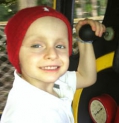Epigenetic Characterization of the Neuroblastoma Driver Genes ARID1A and ARID1B
Background
Cancers arise because of mutations (or mistakes) in their genes. For many cancers, the identification of their most important cancer genes, and an improved understanding of how these effect the cancer cells, has led to new treatments. Neuroblastoma is a childhood tumor that is often difficult to cure.
We have sequenced the entire genetic code of numerous neuroblastomas and discovered mutations in two related genes called ARID1A and ARID1B. We know these genes affect how neural cells behave, and neuroblastoma arises from mutated neural cells, so we expect that these mutations change the natural behavior of neuroblasts to make them cancerous. We now propose further work to better understand how these mutations affect the cancer cells.
Project Goal
We will study a large number of neuroblastoma cell lines that we have classified into groups (ARID1A mutation, ARID1B mutation, or neither). We know that ARID1 proteins are important in the special functions of a group of proteins called the BAF complex that regulates neural development by rearranging the cell's DNA so that different portions can be read and used by the cell (called chromatin remodeling). We will compare these specific DNA and chromatin marks in the different cell lines. We expect to see major differences in how the cells are set up to read their genes, and this may begin to explain some of the features of aggressive neuroblastomas. Ultimately we hope this knowledge provides information that may be exploited through the design of treatments that restore normal BAF signaling in neuroblastoma.

